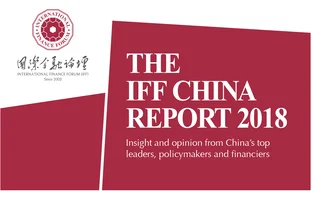
Fintech – Challenges to financial regulation and stability
Fintech has undoubted technological and financial benefits, but the risks of unsupervised complexity, data leaks and threatened consumer rights require the firm hand of regulation, argues Ben Shenglin, IFF Academic Committee member and dean of the Academy of Internet Finance at Zhejiang University


Finance and the real economy are gathering renewed momentum thanks to the rapid integration of traditional finance and financial technology, commonly known as fintech. However, the development of financial innovation, fintech and artificial intelligence (AI) also poses new challenges to financial regulation and the overall stability of the financial industry.
The challenges of fintech to finance
Recently, fintech has become one of the most talked-about financial terms in China. Finance and technological advances have always been intimately linked – in the past 70 years, the invention and integration into everyday life of the computer, the advent of credit cards and the first automated teller machines, or ATMs, have demonstrated the far-reaching effects of finance and technology combined. This trend is now accelerating faster than ever, bringing with it tremendous reverberations for the entire financial industry.

Financial development, in its modern, more technological, intelligent and virtual incarnation, is always accompanied by new challenges. First, fintech has a tendency to decentralise, undermining the role of banks and insurance institutions. Decentralisation of conventional institutions does not necessarily signal democratisation and greater equality, but rather can represent a hidden risk of industry segmentation and the advent of new centralised market actors. Striking a balance is a universal challenge.
Second, fintech is interdisciplinary. Although many fintech products appear to be simple and standardised, they are in fact comprehensive products, melding traits of both finance and technology. This mixing of models and fintech’s virtualisation are two prominent factors that lead to complex channels and modes.
Third, fintech is unmanned, intelligent and mechanised. Its concepts, such as AI, big data and cloud computing, are now very popular but potentially risky. When Google’s self-driving vehicle caused its first road traffic accident in 2016, authorities found it difficult to apportion blame – should the human supervisor, the software designer or the company be held responsible? Similarly, in the financial industry, robot advisers depend on AI self-learning and self-operation to master models and algorithms; if the robot were to move on to the wrong track or bring difficulty to the investment, which side should bear the responsibility: the investor, the stockholder or the programmer? Data security could be compromised by the dangerous leakage of large amounts of sensitive financial data and, in a worst-case scenario, an automated system could even generate and proliferate data leaks far beyond human control. Clearly, fintech is a double-edged sword that must be treated with caution – it has the ability to bring about miraculous improvements in convenience, but could also seriously jeopardise consumer rights.
The challenges of fintech to financial regulation
At the same time, the integration of traditional finance and fintech gives rise to significant regulatory challenges.
First, the financial regulatory system has been outmanoeuvred and outpaced by fintech and internet financial markets. For example, platforms such as Alipay began third-party payment operations as early as 2003, but authorities didn’t issue their third-party payment licences until as recently as 2011. The market often trumps regulation: business operators in China commonly ‘get on the bus first, before buying a ticket’. China’s financial regulatory bodies now face the task of solving this problem.
Second, China’s fintech regulation lags behind more advanced overseas practices. Currently, China can outperform most nations with its booming fintech development, but the UK, Singapore and Australia, among others, have far superior regulatory infrastructures.
Third, China should better administer the relationship between fintech companies and the real economy. China is home to the majority of the world’s most valuable fintech giants, which have brought many benefits to Chinese consumers and have won prestige for China in this emerging field. Maintaining fintech’s role of serving the country, domestic consumers and the real economy is a major challenge.
Effective regulation of fintech
The effective regulation of fintech requires the reaching of consensus over future goals. First, financial stability should be the aim; second, finance should serve the real economy and bring benefits to society; third, finance should strike a balance between innovation, stability, and development; and fourth, consumer rights should be protected.
Fintech ultimately aims to develop a financial system that is fair, transparent, efficient and exhibits goodwill, and three tactics could be profitably employed to this end.
1. Learn from international experience. Fintech is driven by three major global forces: the market, technology and regulation. The market, broadly, refers to that which is driven by consumer demands – something that is abundant in a nascent China. The application of IT in China surpasses that of most other countries – though a gap must still be bridged before attaining the levels of the US. Regulation exposes a shortage in our government, as well as regulatory agencies, systems and capabilities that must be reconciled by studying the techniques of other countries.
2. Strengthen the construction of overall institutional capacity – not just top designs. Current financial supervision remains localised and with Chinese characteristics: meaning local financial bureaus are burdened with huge workloads. Each level of local government – provincial, district and municipal – faces the problems of financial regulation; yet local financial bureaus continually depend on departments such as the National Development and Reform Commission, which lacks manpower and resources. A lack of human resources and limited capabilities are apparent, and therefore makes them all the more pressing for local governments to solve to promote financial stability.
3. Create a friendly ecosystem. To establish and maintain the sustainable development of fintech and the financial industry, market players, corporate self-regulation, trade association and regulatory agencies, as well as public opinion and guidance from educational institutions and media, should all be included in the process.
Fintech has brought many advantages and opportunities to the development of the financial industry, but it has also presented daunting challenges and possible risks. Striking a balance between development and stability, and deciding how best to regulate Chinese fintech giants for the prestige and prosperity of the country and for the advancement of humanity are urgent problems crying out for solutions.
Only users who have a paid subscription or are part of a corporate subscription are able to print or copy content.
To access these options, along with all other subscription benefits, please contact info@centralbanking.com or view our subscription options here: www.centralbanking.com/subscriptions
You are currently unable to print this content. Please contact info@centralbanking.com to find out more.
You are currently unable to copy this content. Please contact info@centralbanking.com to find out more.
Copyright Infopro Digital Limited. All rights reserved.
As outlined in our terms and conditions, https://www.infopro-digital.com/terms-and-conditions/subscriptions/ (point 2.4), printing is limited to a single copy.
If you would like to purchase additional rights please email info@centralbanking.com
Copyright Infopro Digital Limited. All rights reserved.
You may share this content using our article tools. As outlined in our terms and conditions, https://www.infopro-digital.com/terms-and-conditions/subscriptions/ (clause 2.4), an Authorised User may only make one copy of the materials for their own personal use. You must also comply with the restrictions in clause 2.5.
If you would like to purchase additional rights please email info@centralbanking.com

